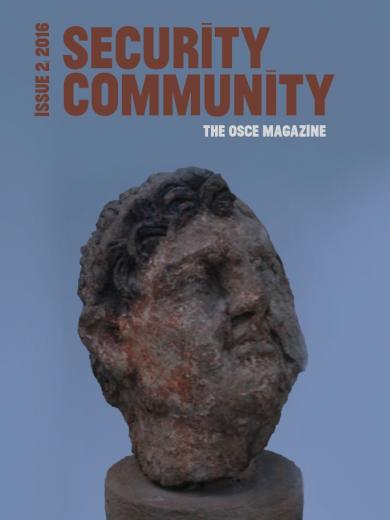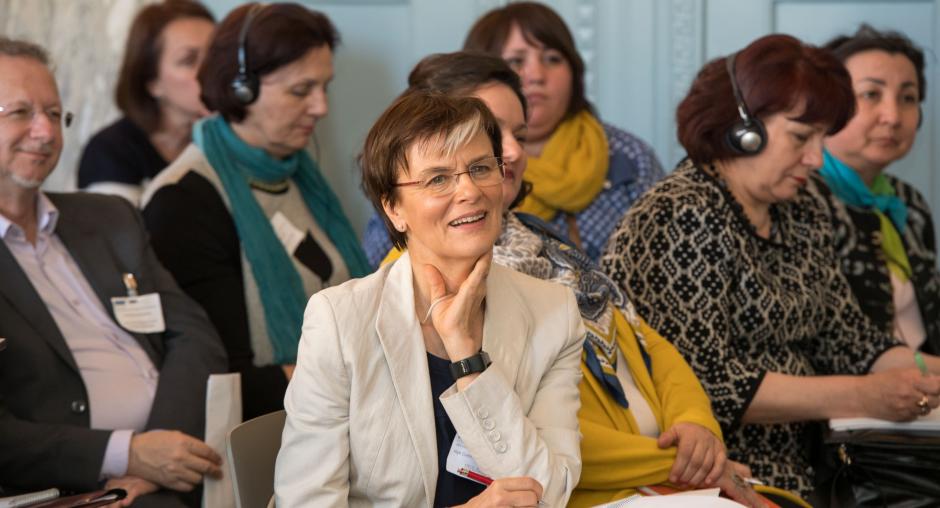Education is the Space where Identities are Negotiated: 20 Years Hague Recommendations Regarding the Education Rights of National Minorities
When Max van der Stoel, the first OSCE High Commissioner on National Minorities, decided to distill four years of behind-the-scenes diplomacy into a set of recommendations to participating States, he chose to focus on the topic of education.
The Hague Recommendations Regarding the Education Rights of National Minorities, four short pages plus an introduction and an explanatory note, attempt, in their own words, “to clarify in relatively straight-forward language the content of minority education rights generally applicable in the situations in which the HCNM is involved.” They can be downloaded here: www.osce.org/hcnm/32180
Van der Stoel’s main concern in the 1990s was the many disputes between minorities and central authorities in Europe’s eastern region. When today’s High Commissioner, Astrid Thors, opened a meeting of experts she convened last April to mark the Hague Recommendations’ 20 anniversary, she referred to the refugee crisis and renewed nationalism and xenophobia in Europe. “What does this document mean for us today?” she asked. Here are some of the answers participants provided.
Astrid Thors
Clear, practical advice
“In the Hague Recommendations Max van der Stoel gave clear, practical advice to participating States on how to organize education for national minorities. He explained how it could be done and, much earlier than many others, he pointed to the need for decentralization, for schools, parents and the school community to have a real say in minority education. Education is in many ways the space where issues of equality, national identity and the concept of nationhood are negotiated.
Van der Stoel also pointed to the need for a balance between integration and mother tongue education, emphasizing that youngsters should enjoy preschool education and the first acquisition of more theoretical vocabulary in their mother tongues before moving on to other languages. If that doesn’t happen, there will be a retraction of the minority culture.
The Hague Recommendations are primarily about the language of instruction. Today, when we work in the field of education, we are confronted also with questions of school optimization, of ensuring quality education for all children. We see the different historic narratives of different groups and how difficult it is to reconcile them. This is as much a matter of tolerance as of language of instruction. In that sense, the Ljubljana Guidelines on Integration of Diverse Societies produced in 2012 by my predecessor, Knut Vollebaek, are a useful complement to the Hague Recommendations.
Looking ahead, we might consider developing a handbook on diversity in education. Why a handbook? Up until now, we have been focusing very much on legislation. It may be time for a more methodological approach, taking into account the many new methods that have been developed for accommodating diversity in the classroom.
One of the challenges I see is that education is defined quite differently in different participating States. Some are now talking in terms of ‘learning outcomes’, that is, what children are expected to have learned while at school. Others are very strict about the exact content of their textbooks. So we have a wide range of approaches, and this is something we would also have to take into account in a handbook.”
Astrid Thors is a former OSCE High Commissioner on National Minorities.
Fernand de Varennes
A Human Rights Document
“The Hague Recommendations were a very brave development because they said that ‘one state, one language’ is no longer a proper European response to the linguistic diversity in Europe. They are a document about human rights, a guideline to what human rights commitments could mean in the area of education and language. As such, they are complemented but not replaced by the later Ljubljana Guidelines, which are about policy development.
Since then, a number of interpretive tools have been developed that are beginning to tell us what these standards could mean in legal terms. For example, the Advisory Committee of the Council of Europe’s Framework Convention for the Protection of National Minorities, in its country reports, is tending to say that if at least 15 per cent of people in a certain territory share the same language, there should be some kind of use of that language in education. The European Court of Human Rights has recently found, in application of the right to education, that everyone has to be given the possibility to learn their national language. Surprisingly enough, that was the first time this has been clearly stated from the legal point of view. So there’s an evolution, I would argue, towards acknowledging that the educational rights of minorities are in fact a human rights application. This is still very young. We have to be patient. But certainly, it is not yet time to put the Hague Recommendations to rest.
The Hague Recommendations note that the first years of education are of pivotal importance in a child’s development and suggest that the medium of teaching in early education should ideally be the child’s language. Numerous studies by academia, UNESCO, even World Bank reports, confirm this. Children taught in their own language for at least six to ten years acquire the literacy and learning skills that allow them to learn other languages better. Also, the more minorities and indigenous people are allowed to learn in their own language, the longer they stay in school. These studies also say that, if it is reasonably feasible, education in the language of minorities should go beyond these first years of education and extend even to higher education. So counter-intuitively, education in the minority language actually serves integration. There is also a gender aspect: girls in indigenous groups or isolated communities might have had almost no exposure to the dominant language and therefore benefit even more than boys when education is in their mother tongue.
Many of the violent ethnic conflicts in the world involve language issues. One example is the conflict in southern Thailand with the Malay-speaking Muslim minority, which claims hundreds of victims every year. Among the main targets are public schools.
Public education in a minority’s language provides employment opportunities and facilitates the integration of minorities. Denying it can be dangerous by creating forms of exclusion and alienation.”
Fernand de Varennes, a leading expert on the human rights of minorities, is Dean of the Faculty of Law of the Université de Moncton, Canada and Extraordinary Professor at the Centre of Human Rights of the University of Pretoria, South Africa.
Sia Spiliopoulou Åkermark
Opening Up to Diversity
“The world has changed in the 20 years since the Hague Recommendations. Knowledge has become globalized; communication and business no longer know any borders. I find that fantastic; it’s a very challenging time intellectually. It is also dangerous: it can be captured by all kinds of one-sided political or financial interests. We want our children to be able to adapt to this new unpredictable world. I think what international law can offer in such a situation – and this why the Hague Recommendations and the Ljubljana Guidelines are so valuable – is to put the child’s interests first.
In the Hague Recommendations this was expressed in terms of the rights of parents: “states should adopt measures to encourage parental involvement and choice in the educational system.” I think in many ways this is a very wise starting point, because the child needs a safe environment to bloom and take the position it deserves in the future. At the same time our understanding has changed in the past 20 years. Now we tend to see the rights of the child at the centre, because sometimes parents can be setting other priorities or be under other stresses.
The nation state paradigm that was created in the 19th century is coming under pressure. Still, especially in Europe, there is a strong tradition of the general right to education, and we should build on this tradition. Guaranteeing the right to education is the responsibility of the state. It must allow itself to open up, to see the education of young people as something that transcends national, ethnic and religious borders.
Diversity is not a matter of policy choice; it is a matter of fact. Sooner or later we will have to confront it. The question is: how do we build upon the positive European achievement in education, adding diversity?”
Sia Spiliopoulou Åkermark is Director and Head of Research of the Åland Islands Peace Institute, Finland.
Jan de Groof
Tackle Education First
“Max van der Stoel was showing great prescience when he chose in the Hague Recommendations to focus on education. In managing the transition from a non-democratic regime to democracy, you have to tackle the most sensitive, the most difficult issue first, and that is schools and education. Within schools, you have to establish diversity. And then you can try to be successful as a society.
At the same time, reaching consensus on school policy is very tough. All conflicts of society – cultural, religious, linguistic and socio-economic – are reflected in education.
In my country, Belgium, for instance, it was quite difficult for the state to recognize the three linguistic communities, Flemish, French and German. In the 1950s there was a so-called school war, a societal conflict among Catholics, Freemasons, the north and the south. A pact was finally signed in 1958. The state agreed to co-finance confessional schools on the condition that they were fulfilling laws on quality and equality and that their teachers had the required official diploma. Only once that consensus on education was reached did it become possible to achieve concessions in other areas.
In Europe today we are facing a huge educational challenge with the arrival of 200,000 new migrant children. What should we do? First of all, we need to accept them and respect the fundamental rights of refugees and so-called illegal migrants. We have to acknowledge the primary role of education for their future and also for the future of society.
We could see this as an enormous opportunity. Some countries, like Germany, are doing so. In higher education, for instance, they are creating student places on a massive scale. This is the only feasible reaction. To respond reluctantly is not an option.
Will European states be able to respond to the newcomers’ basic educational needs? The question is urgent. We have to invest, create capacity, train teachers. Otherwise, there will be tensions, frustrations, Europe will fail. This will be the most sensitive topic for Europe in the decades to come.”
Jan de Groof is the founder and President of the European Association for Education Law and Policy (ELA). A university professor and frequent consultant for international organizations, he took part in several diplomatic missions of the first OSCE High Commissioner on National Minorities, Max van der Stoel.
Welcome to Security Community
Security Community is the OSCE’s online space for expert analysis and personal perspectives on security issues.
The views expressed in the articles are those of the authors and do not necessarily reflect the official position of the OSCE and its participating States.


